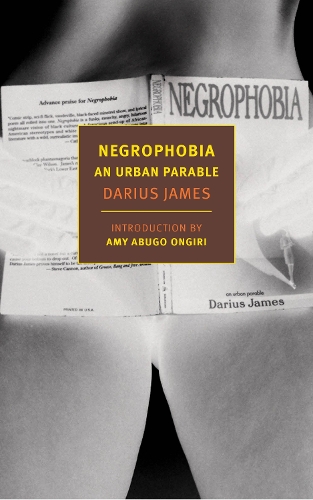
Negrophobia: An Urban Parable
(Paperback, Main)
Publishing Details
Negrophobia: An Urban Parable
By (Author) Amy Abugo Ongiri
By (author) Darius James
New York Review Books
NYRB Classics
19th February 2019
Main
United States
Classifications
General
Fiction
813.54
Physical Properties
Paperback
208
Width 130mm, Height 204mm, Spine 17mm
220g
Description
A provocative, raucous dark comedy about race and racism in America, now back in print after twenty-five years. Negrophobia, with its outrageous and electrifying mix of screenplay, poetry, and performance piece on paper, pushes the conventional territory of the novel to its outer, outer limits. Raunchy and rambunctious, Darius James turns words into flesh and flesh into monstrous forms. His writing is as intoxicating as the works of William Burroughs and Ishmael Reed. Under the earthshattering effects of a voodoo spell, blond teenage sex-bomb Bubbles Brazil is plunged into a startling realm of grotesque racist visions. Horrific figures populate this parallel world wherein the demagogic Uncle H. Rap Remus calls for the instant extermination of the white race by spontaneous combustion and various citizens of Harlem are found floating in a haunting underwater dreamscape. In Negrophobia worlds collapse and re-form, people explode into strange and unnatural beings from conga-drumming Muslims and ill-tempered young Negroes with numbers instead of names to Muppet-like crack-heads and a visionary extraterrestrial who never combs his hair. By the final scene, Bubbles herself has been transformed after the strangest trip a girl can have.
Reviews
"In this social-media era, when we are more intent than ever on isolating things that offend and outrage,Negrophobiarevels in its own outrageousness, and thus is more of a tonic now than it was almost three decades ago. It neither blinks nor recoils at the stereotypes, insults, and presumptions that have been used to cage and subdue African American self-esteem, but compels its readers to confront rather than retreat from or smooth over the retro Jim Crow imagery.American literature has seen the ascent of talented young black writers who arent willing to settle for parochial or hidebound conceptions of who they are and what they should sayand its a fine time to be reminded that crazy, willful acts of hoodoo storytelling such asNegrophobiahelped make this renaissance possible." Gene Seymour, Bookforum
Luridly funny and unsparingly smart, Negrophobia is American arcana of the highest order. And like all truly cool books, destined to forever be ahead of its time. Paul Beatty
Darius James is a great writer. Kathy Acker
I opened Jamess book only to topple into hell. In fact, Negrophobia is the black version of American Psycho. Dany Laferrire, Los Angeles Times
I read Negrophobia when I was still in grad school. . . . It was one of those good but rare occasions when I thought there might be one other person in the world that would get what I was doing. Kara Walker, DB Artmag
"Comic, manic, and amazing, [Negrophobia] tells more about American race relations than all of the walking dead suburban experts, academics, and think tank whores who tell their fellow suburbanites about how it feels to be black." Ishmael Reed
"Jarring, outrageous images hurtle from nearly every page of this postmodern vivisection of the contemporary African American condition.... There is imagination and wicked humor in all of this, as well as some piercing insight." Publishers Weekly
"This is a novel of exposure, not solution. Those willing to take the ride will find language and imagery that provide an understanding of everything offensive and American. To see Bubbles dragged through the mire of racial and sexual taboos is to experience the reclamation of the icons and stereotypes that are the signposts of relations among Americans. Its not an altogether pleasant experience. No one who reads Negrophobia is playing in the dark -- just lost in it. The novel, however, is no more unpleasant an experience than, say, having a police baton swung at your body, or having a steel-tipped boot kick you a few hundred times after youve been dragged out of your tractor-trailer. With its feet firmly planted in the satiric tradition of Voltaire Ishmael Reed, John Kennedy Toole, and Okot pBitek, Jamess book is both timely and necessary." Christian Haye, The Village Voice
"Wild, non-stop phantasmagoria...In style, theme, and tone, the work of performance artist James is somewhat reminiscent of Ishmael Reed or Amiri Baraka, but his dialog is snappier. The vibrant prose makes for lively reading. Highly recommended." Library Journal
"A pop-schlock phantasmagoria that owes as much to William Burroughs as it does to S. Clay Wilson. Jamess raucous debut is by far the best novel to emerge from New Yorks Lower East Side literary scene." Kirkus
"Darius James is one of the funniest writers in America, and one of the most serious. His subject is the big one: slavery; his questions are the big ones: who is slave to what" George Trow
"Comic strip, sci-fi flick, vaudeville, black-faced minstrel show, and lyrical poem all rolled into one. Negrophobia is a funky, raunchy, angry, hilarious nightmare vision of black culture. A ferocious send-up of African-American stereotypes and white racism. Darius James bursts into literature with a wild, surrealistic imagination." Catherine Texier
"Darius James is a dazzling scenarist, a wanton imagist and a nubile perpetrator of the great felony on new literature. This is a writer of blazing intensity. Forever may he wave." Joel Rose
"This book is not a novel but a curse which will explode in your mind and cause your bottom to drop out. Of all the neo-hoodoo cosmogonic jesters, Darius James proves himself to be the most promising." Steve Cannon
Author Bio
Darius James is a writer and performance artist. He is the author of That's Blaxploitation, Voodoo Stew, and Froggie Chocolate's Christmas Eve and his writings have appeared in multiple publications, including the Village Voice and Spin. He also co-wrote and appeared in the 2013 film The United States of Hoodoo. He lives in Connecticut.
